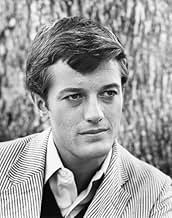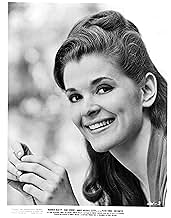AVALIAÇÃO DA IMDb
6,8/10
3,5 mil
SUA AVALIAÇÃO
Um veterano de guerra consegue um emprego em um manicômio onde encontra a bela, mas excêntrica Lilith.Um veterano de guerra consegue um emprego em um manicômio onde encontra a bela, mas excêntrica Lilith.Um veterano de guerra consegue um emprego em um manicômio onde encontra a bela, mas excêntrica Lilith.
- Direção
- Roteiristas
- Artistas
- Prêmios
- 2 indicações no total
Walter Arnold
- Lonely Girl's Father
- (não creditado)
Rene Auberjonois
- Howie
- (não creditado)
Elizabeth Bader
- Girl at Bar
- (não creditado)
Ruth Baker
- Patient
- (não creditado)
Janet Banzet
- Patient
- (não creditado)
Amelie Barleon
- Patient
- (não creditado)
Carson Barnes
- Child Crossing Street
- (não creditado)
Jeanne Barr
- Miss Glassman
- (não creditado)
David Barry
- Ambulance Attendant
- (não creditado)
- Direção
- Roteiristas
- Elenco e equipe completos
- Produção, bilheteria e muito mais no IMDbPro
Avaliações em destaque
This is a film I have never seen and I enjoyed the great acting by Warren Beatty, (Vincent Bruce) and Jean Seberg, (Lilth Arthur). Vincent Bruce is a Korean War Veteran and has returned to his home town and is trying to find a job and eventually he finds work in a mental institution. Vincent is assigned to a help a very attractive blonde girl named Lilth who never goes outside and once she set her eyes on Vincent things change and there becomes a great improvement with her mental state of mind. Lilth really spins a web all around Vincent and even teases him with a lesbian relationship with another female inmate. This is a very different and interesting film with young stars just starting out like, Gene Hackman and Peter Fonda.
7YAS
One of the great pleasures of watching older films is that, beyond the obvious joys of character and plot, they also offer us a look past the films' action and into the world in which they were made: the fashions of dress, design, and social attitude that prevailed at the time. All of this "background," so taken for granted by the filmmakers in their day, can, when seen across a focal space of time and social change, reveal fascinating elements unguessed-at when the films were made.
So it is with LILITH. Other comments on this film have more than adequately discussed the plots and motivations of the characters; what I found unexpectedly mesmerizing and appalling was its view of the mental institution of the mid-1960s. Warren Beatty's character has no experience in such a setting, but he'd like to "help people," so he's hired on the spot and immediately put in charge of patients who, by definition, aren't responsible for their own actions. The inmates seem to be mostly left to do as they please, whether it be teetering at the edge of a precipitous cliff or wandering off in the woods, easily slipping away from their inattentive keepers.
When Beatty's character begins to be attracted to Lilith, the chief shrink calls him in and asks if this is the case. "No, I don't think so," says Beatty, patently lying through his teeth. "Well," says Dr Big reassuringly, "it's not unheard-of for patients to fall in love with the orderlies, and sometimes, unfortunately, it happens the other way as well." And that's that: with this appalling (to modern-day ears, at any rate) bit of 'advice,' or possibly nudge-wink encouragement, he pats the oafish horndog on the back, tells him he's doing a great job, and sends him off to town on yet another date with Lilith. Whenever Beatty does express concern about anything job-related, the medical staff just interrupts him with "don't worry, you're doing a fine job" and gently shoos him out.
What a different world it was, forty years ago! Mind you, I'm not judging the film by social standards that never occurred to its time; indeed, the things it reveals about the 'care' of mental patients in 1963 are what made it most interesting to me. All the characters are either entertainingly insane or arrestingly clueless idiots, and Lilith herself is a sufficiently complex and compelling character to make this melodrama watchable all on her own.
So it is with LILITH. Other comments on this film have more than adequately discussed the plots and motivations of the characters; what I found unexpectedly mesmerizing and appalling was its view of the mental institution of the mid-1960s. Warren Beatty's character has no experience in such a setting, but he'd like to "help people," so he's hired on the spot and immediately put in charge of patients who, by definition, aren't responsible for their own actions. The inmates seem to be mostly left to do as they please, whether it be teetering at the edge of a precipitous cliff or wandering off in the woods, easily slipping away from their inattentive keepers.
When Beatty's character begins to be attracted to Lilith, the chief shrink calls him in and asks if this is the case. "No, I don't think so," says Beatty, patently lying through his teeth. "Well," says Dr Big reassuringly, "it's not unheard-of for patients to fall in love with the orderlies, and sometimes, unfortunately, it happens the other way as well." And that's that: with this appalling (to modern-day ears, at any rate) bit of 'advice,' or possibly nudge-wink encouragement, he pats the oafish horndog on the back, tells him he's doing a great job, and sends him off to town on yet another date with Lilith. Whenever Beatty does express concern about anything job-related, the medical staff just interrupts him with "don't worry, you're doing a fine job" and gently shoos him out.
What a different world it was, forty years ago! Mind you, I'm not judging the film by social standards that never occurred to its time; indeed, the things it reveals about the 'care' of mental patients in 1963 are what made it most interesting to me. All the characters are either entertainingly insane or arrestingly clueless idiots, and Lilith herself is a sufficiently complex and compelling character to make this melodrama watchable all on her own.
The mental institution in this film, called "Poplar Lodge" I believe, is modeled on Chestnut Lodge, a Bethesda, Maryland institution famed for early attempts to establish interpersonal relationships with (rich) psychotic patients. This fits the institutional style depicted in this film. Hopwever, the main characters do not seem to be mentally ill so much as metaphores for the madness es in our society. The perception that sexual expression represents evil or crazy behavior, not changed all that much from the time this film was made, frequent wars, and the way sensitive people are brushed aside as others hustle toward dubious goals, are all personified as forms of madness. Okay so far.
But the film does not quite work. The character played by Anne Meacham, seething with barely suppressed sexuality, works, but Lilith, played as a golden haired all American, girl next door beauty, doing and saying odd things, making up her own language, seeing herself as an outside observer of our society, is a character which doesn't hit home. She seems more quirky than mad. That she drives men into destructive actions seems somehow unlikely. At the most, she may be a catalyst for their weaknesses to be expressed.
Jean Seberg doesn't personify madness. She seems just bemused. Warren Beatty conveys a lack of inner direction, a developing depression, and strange longings by looking blank, seeming inarticulate, and acting as if he has no idea of the direction his next step will take. All of this slows this film down to a very languid pace, frequently accompanied by a relaxed bop-along jazz score. Thus, the film is too slow, a long windup for a soft pitch. It is hard to feel much tension, even though it is clear that there is supposed to be a lot of tension. Nice try, but no cigar.
But the film does not quite work. The character played by Anne Meacham, seething with barely suppressed sexuality, works, but Lilith, played as a golden haired all American, girl next door beauty, doing and saying odd things, making up her own language, seeing herself as an outside observer of our society, is a character which doesn't hit home. She seems more quirky than mad. That she drives men into destructive actions seems somehow unlikely. At the most, she may be a catalyst for their weaknesses to be expressed.
Jean Seberg doesn't personify madness. She seems just bemused. Warren Beatty conveys a lack of inner direction, a developing depression, and strange longings by looking blank, seeming inarticulate, and acting as if he has no idea of the direction his next step will take. All of this slows this film down to a very languid pace, frequently accompanied by a relaxed bop-along jazz score. Thus, the film is too slow, a long windup for a soft pitch. It is hard to feel much tension, even though it is clear that there is supposed to be a lot of tension. Nice try, but no cigar.
Beautiful, involving and at times lyrical film with early performances from Warren Beatty and Gene Hackman. Beatty was, of course, moving fast and would have Hackman with him a couple of years later in Bonnie and Clyde. But here is a much more subdued and thoughtful young star seemingly happy to allow the devastatingly overlooked Jean Seberg show here just what she could do and how she might have become a much bigger star. Peter Fonda also impresses as a fellow inmate with Seberg as he tries to enlist Beatty as a go between. The trainee staff member is already, himself, bewitched by the lovely Lileth (Seberg) however which will have tragic repercussions. The director was much admired in Europe and Seberg had sparkled before with Goddard so the fact the film looks a little more European than American at times should not be so surprising. There is a sinister air to this tale of life in a private insane asylum but whilst we get shots of damaged spider webs and the staring eyes and groping hands of patients we also get flowing water, reflections of the sun and trees and ladies dresses. We know this will not end well but such are the performances and cinematography as well as sharp eyed direction, this is always a pleasure for we too become entranced by the devilish doings of the crazy lovely as personified by Jean Seberg in her finest performance.
This forgotten, totally under-appreciated film from 1964 is very powerful (I believe it was Robert Rossen's last film). Strangely hypnotic and frightening in a very subtle way, this showed Beatty three years before B&C showing the potential he had in Splendor in the Grass. He also met Gene Hackman while making this and later cast him as his brother in B&C which launched Hackman.
There is also a splendid performance from Peter Fonda, of all people. As Hackman's wife, Jessica Walter showed how amazing she was at a relatively young age and just never got the right parts in decent films. You'll also see a young Rene Auberjenois and Olympia Dukakis in a bit part. I hope more people look into this devastating piece on mental illness.
There is also a splendid performance from Peter Fonda, of all people. As Hackman's wife, Jessica Walter showed how amazing she was at a relatively young age and just never got the right parts in decent films. You'll also see a young Rene Auberjenois and Olympia Dukakis in a bit part. I hope more people look into this devastating piece on mental illness.
Você sabia?
- CuriosidadesAccording to Kim Hunter: "The tensions on the set contributed to his [Rossen's] death. I don't think I want to talk about it. Since then, Warren has grown so; at that time, he wasn't ready to be a star. He knew it and was scared! In rehearsal, he'd be great. The closer he got to the camera, the more he'd retreat. He'd cut half his lines, which made Warren interesting and the rest of us talky as hell! He gave Jean no help whatsoever. She was damn good in a demanding role. At the wrap party, a group of people threw Warren into a stream".
- Erros de gravaçãoWhen the staff and patients are loading up to go on their picnic, two of the cars are 1955 Cadillac Fleetwood 75's. When they arrive at their destination, the cars have changed into 1958 and 1959 Cadillac Fleetwood 75's. The station wagon has changed from a 1959 Ford Country Squire to a 1960 Ford Country Squire.
- Citações
Lilith Arthur: If you should discover that your god loved others as much as he loved you, would you hate him for it?
- ConexõesFeatured in From the Journals of Jean Seberg (1995)
Principais escolhas
Faça login para avaliar e ver a lista de recomendações personalizadas
- How long is Lilith?Fornecido pela Alexa
Detalhes
- Data de lançamento
- País de origem
- Idioma
- Também conhecido como
- Robert Rossen's Lilith
- Locações de filme
- Great Falls, Virgínia, EUA(picnic scenes)
- Empresas de produção
- Consulte mais créditos da empresa na IMDbPro
Bilheteria
- Faturamento bruto mundial
- US$ 542
- Tempo de duração
- 1 h 54 min(114 min)
- Cor
- Proporção
- 1.85 : 1
Contribua para esta página
Sugerir uma alteração ou adicionar conteúdo ausente



































